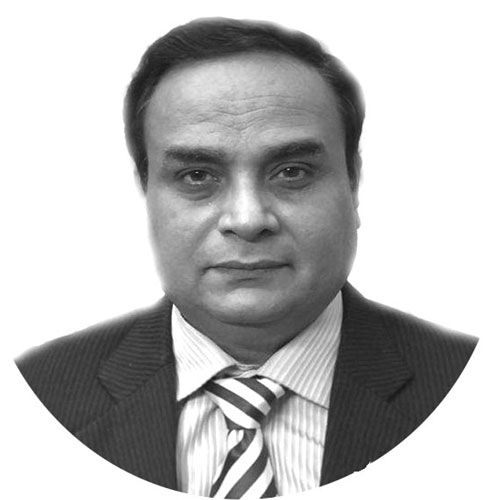Dr Mehmood-ul-Hassan Khan
THE Kingdom of Saudi Arabia, the biggest economy of the GCC and MENA has been blessed with holy shrines, prophecies and unlimited profits too. Most recently, while speaking to the World Economic Forum strategic dialogue virtual event the Crown Prince Mohammed bin Salman showcased the present potential of his national economy having future prospects reaching $3 trillion of investment. He clarified it would be expected in new projects other than the Vision 2030.
He projected that 85 percent of this huge economic program would be funded by the Kingdom’s sovereign wealth fund, the Public Investment Fund (PIF) and the Saudi private sector which would revolutionize the national economy. It would further enhance Saudi Arabian national drive of economic diversification in the days to come. It would generate investments, new partnerships, new joint ventures and last but not the least, new jobs for the youth. It would also further enhance capacity building mechanism in the country.
It would attract more and more inflows of Foreign Direct Investments (FDIs) from the GCC as well as other countries due to which it is expected that investment opportunities in Saudi Arabia will be amounting to $6 trillion over the next decade. It is estimated that it would encourage the private sector in the country as well as provide an equal playing field for the other regional countries too to participate in the future socio-economic and infrastructural development of Saudi Arabia through securing a befitting commercial proposition with the state guarantee of investments.
To meet the 2030 Sustainable Development Goals (SDGs) and climate change targets the government of Saudi Arabia planned to build a new zero-emissions city at its proposed NEOM economic zone in the country’s northwest. It is a giant step towards further economic diversification. It would also accelerate the non-oil sector of the economy thus creating strategic balance in the macro-economy in the days to come.
According to Saudi Arabian officials (January, 2021) the new proposed city, dubbed “The Line”, will be a city of one million residents with zero cars, zero streets and zero carbon emissions. It would be a first giant step of Saudi Arabian government towards the development of “Smart-City” in the country in which modern technologies especially Artificial Intelligence (AI) will play a very important role in the future. It is going to build on the coasts of the Red Sea and Gulf of Aqaba. According to the Saudi Press Agency (January, 2021) the proposed city will be “built around nature” as “a response to some of the most pressing challenges facing humanity today, such as legacy infrastructure, pollution, traffic and human congestion”.
Crown Prince Mohammed bin Salman stressed the need for strong policies against climate change to achieve the desired targets of de-carbonization in the country. He further mentioned that by 2050, one billion people will have to relocate due to rising CO2 emissions and sea levels. 90 percent of people breathe polluted air. He showed his strong resolve to protect nature along with maintaining pace of development through the noble concept of smart economy, smart living and smart cities. The new proposed city “The Line” (linking Jordan & Egypt via Saudi territory) is a cornerstone of the Saudi Vision 2030 and is aimed as an economic engine for the KSA to push-forward its drive of diversification. It is hoped that it would contribute some Saudi Riyal (SR) 180bn ($48 billion) to Saudi Arabia’s domestic GDP by 2030. Its construction will be started in the first quarter of 2021.
The new dubbed city “NEOM” (170 kilometres) is a high-tech development near the Red Sea. It would be entirely powered by renewable energy (solar). While highlighting its salient features, the Crown Prince said that the entire development will be net-zero and pollution-free. No journey within The Line will be longer than 20 minutes. It will be an ideal combination of science and arts, human creativity and artificial intelligence, dream and reality and moreover, fiction and futuristic orientations.
Interestingly, the absence of roads and vehicles will not create any inconvenience to the city’s inhabitants since “all essential daily services, such as schools, medical clinics, leisure facilities as well as green spaces will be located within a five-minute walk. The graphic of this city shows trains and autonomous freight vehicles running in “an invisible layer of infrastructure” beneath the city.
For longer distance travel, inhabitants will have access to “ultra-high-speed transit and autonomous mobility solutions” with “no journey longer than 20 minutes”. Crown Prince Mohammed bin Salman is indeed a “visionary” leader to transform the outlook of the KSA by applying “holistic” and “futuristic” policies and plans. He maintains a “strategic balance” between his rich traditions and policies of economic transformation. He secures a “strategic cushion” between diversification and community development. He upholds “fantasies” of his immaculate civilization and future orientations in which KSA “Vision 2030” holds the key of further economic diversification, massive industrialization, institutionalization of smart economy, green technologies, promotion of AIs, digitalization, superior human security, qualitative human capital, education and women empowerment in his country.
Moreover, the commencement of the new futuristic city the “Line” would be a game changer in the country’s living style by promoting traditions of smart-city and smart-living. Protection of nature and drastic reduction of carbon footprints have been an inspirational factor in the national policies of the KSA since the announcement of the Vision 2030 and building of the new city NEOM would be a giant step towards achieving this goal in the days to come.
—The writer is Director, Geopolitics/Economics Member Board of Experts, CGSS.










